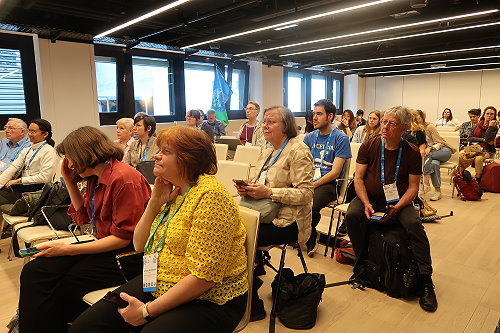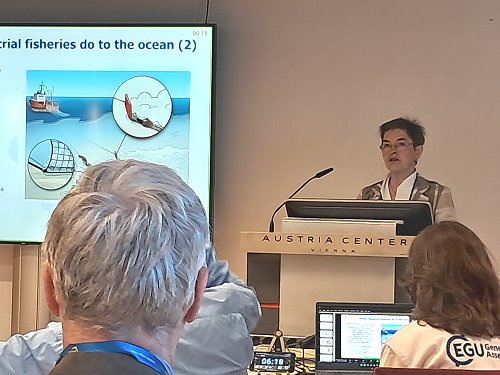As has become a tradition at the General Assembly of the European Geosciences Union that is convened annually in Vienna, the last day, Friday, May 2, 2025, featured three sessions of talks and a poster session focused on geoethics. These are curated by and in collaboration with the International Association for Promoting Geoethics (IAPG), which has 3275 members in 130 countries on five continents. So far 37 national sections have been formally set up. IAPG members produce books, offer training and technical advice and otherwise promote ethics among practitioners of the geosciences.
 This year’s sessions focused on pedagogical means of engaging citizens in different countries in activities aimed at enhancing ocean and climate literacy, mobilising citizen science, or doing science with s strong experiential approach of exposing oneself to environmental challenges by taking measurements with minimal invasiveness. These were complemented by a few more conceptual presentations on geoethics in the Anthropocene and how research centres make progress in reducing their ecological footprint. A number of presentations showed applications of role plays as learning tools.
This year’s sessions focused on pedagogical means of engaging citizens in different countries in activities aimed at enhancing ocean and climate literacy, mobilising citizen science, or doing science with s strong experiential approach of exposing oneself to environmental challenges by taking measurements with minimal invasiveness. These were complemented by a few more conceptual presentations on geoethics in the Anthropocene and how research centres make progress in reducing their ecological footprint. A number of presentations showed applications of role plays as learning tools.
Mundus maris presented a paper by Cornelia Nauen and Marcelo Morales Yokobori on first experiences with the biodiversity role play ‘Protecting Blue Horizons’ in the first session chaired by David Crookall and colleagues of IAPG. The role play is intended for young adults and invites them to impersonate profiles of different people and organisations affected by a marine protected area (MPA). Among the roles are: the mayor, scientists, economic interest groups like industrial and coastal fishers, tourism and an off-shore wind farm, but also nature conservationists and yet others. The objective of the deliberation is to make the MPA work in practice through constructive search of a consensus which strikes a balance between biodiversity protection, and social and economic interests. The design explicitly allows for local adaptation or to use a fictitious place and configuration to emphasise the focus on learning, not comparative performance. In the process, participants can encounter and appreciate the richness of perspectives and learn how to marshal the arguments of their role. Feedback from the first tests already led to some adjustments.
 It is recommended to use the service of a moderator to make sure the conversation remains focused on the objective and all voices are being heard. If no consensus is achieved after the allotted time, it is fair to close agreeing to disagree and possibly schedule a second or third round of discussions. It is strongly encouraged to schedule sufficient time for the debriefing after a round of discussions so that participants can reflect on the process, the arguments and their very personal experience during the debate.
It is recommended to use the service of a moderator to make sure the conversation remains focused on the objective and all voices are being heard. If no consensus is achieved after the allotted time, it is fair to close agreeing to disagree and possibly schedule a second or third round of discussions. It is strongly encouraged to schedule sufficient time for the debriefing after a round of discussions so that participants can reflect on the process, the arguments and their very personal experience during the debate.
It is recommended to present results as exploratory without judgement. The material is highly adaptable, e.g. by using not the full set of stakeholders, but a selection of core roles if time is short. It can be made freely available in several languages to any interested party. Feedback is highly appreciated in order to keep improving the material and share intermediate experiences with others. The abstract can be downloaded here. The slides of the presentation are available here.
The rich interactions during the day and the follow-up made participation in this edition of EGU most worthwhile.
Contact info[at]mundusmaris.org if you want to use the role play in your setting and provide feedback for continuous learning and improvements. Available languages are EN, FR, ES, DE so far.
